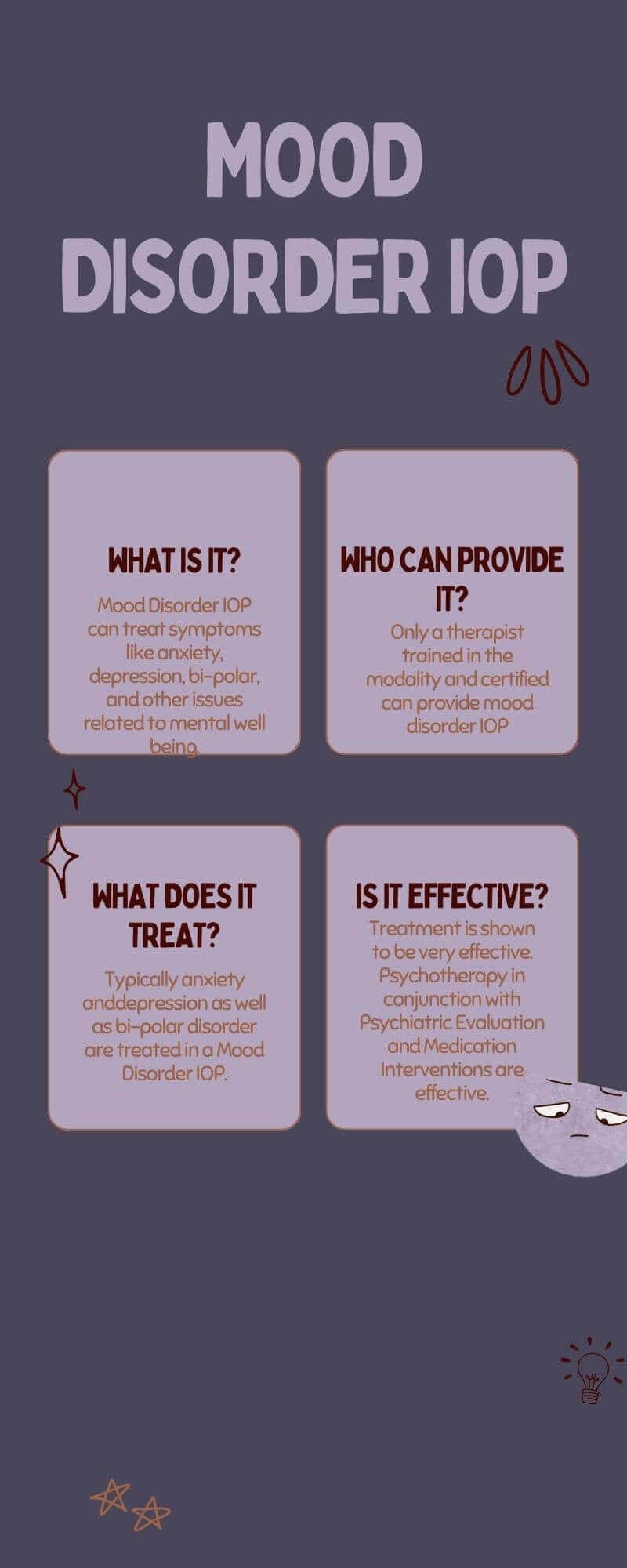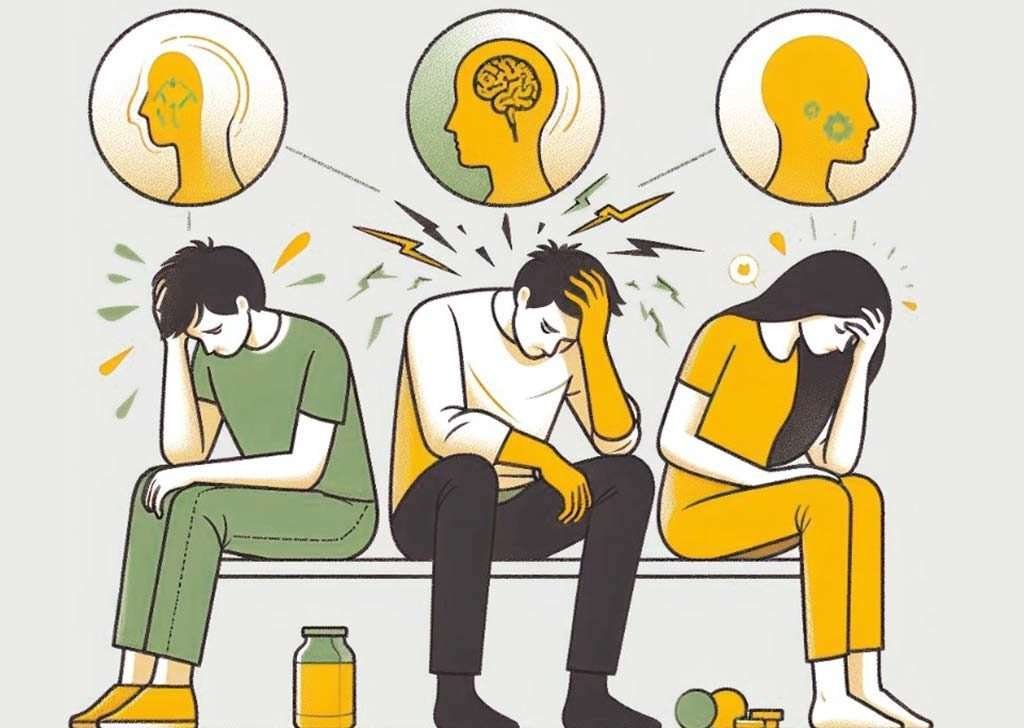Iop for Depression: If you’re struggling with depression, you might feel like you’ve tried everything and still can’t find relief. It’s exhausting, frustrating, and sometimes isolating.
But what if there was a middle ground between traditional therapy and full-time inpatient care? That’s where an Intensive Outpatient Program (IOP) for depression comes in. This treatment option is designed to give you the support you need without completely disrupting your daily life.
Curious about how it works and if it’s right for you? Keep reading, because this might just be the solution you’ve been searching for.

Credit: ethoswellness.com
What Is Iop For Depression
If you’re navigating life with depression, finding the right treatment can feel overwhelming. Intensive Outpatient Programs (IOPs) for depression offer a structured yet flexible option for those who need more support than weekly therapy but don’t require full-time hospitalization. These programs provide a middle ground, helping you manage your symptoms while maintaining your daily routine.
What Does Iop For Depression Involve?
IOP for depression typically includes therapy sessions, group discussions, and skill-building activities. Sessions often occur several times a week, allowing you to dive deeper into your mental health without putting your entire life on pause. Many programs also include family therapy, which can help strengthen your support system at home.
For example, you might attend three-hour sessions three times a week, focusing on cognitive behavioral therapy (CBT) to tackle negative thought patterns. These targeted approaches can make a huge difference, offering tools you can use long after the program ends.
Who Should Consider Iop For Depression?
IOPs are ideal if traditional therapy isn’t enough but inpatient care feels like too much. You might benefit if your symptoms interfere with work, school, or relationships but you can still manage daily tasks with some support. It’s also a great option if you’ve recently left an inpatient program and want a smoother transition to everyday life.
Think about your current situation. Are you feeling stuck despite regular therapy? Do you need more than one hour a week to address your concerns? If yes, IOP might be worth exploring.
Benefits Of Iop For Depression
One major advantage is flexibility. You can attend sessions while keeping your job, going to school, or taking care of your family. This balance lets you focus on your mental health without stepping away from your responsibilities.
Another benefit is the sense of community. You’ll meet others who understand what you’re going through, which can reduce feelings of isolation. Sharing experiences in a group setting often leads to breakthroughs you might not achieve on your own.
How To Get Started With An Iop
Start by talking to your therapist or doctor. They can help you decide if an IOP is the right fit and recommend reputable programs in your area. Many programs accept insurance, so check with your provider to understand your options.
Before enrolling, ask questions about the program’s structure, therapies offered, and schedule. Knowing what to expect will help you feel more prepared to take this step toward better mental health.
Are you ready to prioritize your well-being? IOP for depression might be the next step on your journey to feeling better.

Credit: connectionswellnessgroup.com
How Iop Differs From Other Treatments
Finding the right treatment for depression can feel overwhelming. Intensive Outpatient Programs (IOPs) stand out because they bridge the gap between traditional therapy and inpatient programs. They offer a unique structure that prioritizes flexibility while maintaining a strong focus on recovery. So, how does IOP actually differ from other treatments?
Comparison With Inpatient Programs
Inpatient programs require you to stay at a facility 24/7. They’re designed for severe cases where constant monitoring is crucial. While effective, they often disrupt daily life completely.
IOPs, on the other hand, allow you to continue your regular routine. You can go to work, attend school, and live at home. This makes IOPs a practical choice if your depression is serious but manageable without full-time care.
Another key difference is cost. Inpatient programs are often more expensive due to the round-the-clock services they provide. IOPs offer a middle ground that’s both effective and typically more affordable.
Comparison With Traditional Therapy
Traditional therapy usually consists of one hour-long session per week. It’s great for those with mild depression or who prefer a slower approach. But if your symptoms feel overwhelming, weekly sessions may not be enough.
IOPs offer multiple sessions per week, often lasting several hours. This increased frequency gives you deeper emotional support and faster progress. You’re not waiting days to talk about what’s troubling you.
Group therapy is another standout feature of IOPs. You’ll interact with others facing similar challenges, gaining insights and encouragement from shared experiences. Traditional therapy is often one-on-one, which might feel isolating in comparison.
Have you ever wondered if your depression treatment is truly meeting your needs? If traditional therapy feels too slow or inpatient care seems too intense, IOP might be the balanced solution you’re looking for.
Core Components Of An Iop Program
Intensive Outpatient Programs (IOPs) for depression provide structured care. They bridge the gap between inpatient treatment and standard outpatient therapy. These programs focus on helping individuals manage symptoms while living at home. A well-designed IOP includes essential components that promote recovery. Below are the core elements that make an IOP effective and impactful.
Therapy Sessions And Group Support
Therapy sessions are the foundation of any IOP for depression. These sessions often include individual therapy to address personal challenges. Group therapy provides a safe space to share experiences and learn from others. It fosters connection and reduces feelings of isolation. Discussions in groups also build understanding and emotional support among participants.
Medication Management
Medication management plays a vital role in treating depression. In an IOP, professionals monitor medications to ensure they are effective. Adjustments are made based on progress and side effects. This close supervision helps maintain stability and reduces risks. Regular check-ins with medical staff keep treatment on track.
Skills Training And Coping Strategies
Skills training teaches individuals how to manage stress and emotions. Participants learn practical tools to navigate daily challenges. Coping strategies are tailored to help deal with triggers and negative thoughts. These skills promote resilience and build confidence for long-term recovery. Structured lessons ensure participants can apply what they learn in real life.
Benefits Of Choosing Iop
Intensive Outpatient Programs (IOP) for depression offer a unique balance of structure and flexibility, making them an excellent choice for many individuals. They provide a middle ground between full-time inpatient care and traditional therapy sessions. Let’s dive into some specific benefits of choosing IOP and how it can fit into your life.
Flexible Scheduling
IOPs are designed with your daily life in mind. Sessions are often scheduled during evenings or weekends, allowing you to attend therapy without disrupting work, school, or family commitments. This flexibility means you don’t have to put your life on hold to prioritize your mental health.
Unlike inpatient programs, you can return home after each session. This means you’re still present for important moments with loved ones while receiving the care you need. It’s a win-win for those juggling multiple responsibilities.
Cost-effective Care
IOPs are significantly more affordable than inpatient care. You get structured support without the added cost of staying in a treatment facility. For those on a budget or with limited insurance coverage, this can make a huge difference.
Insurance providers often cover IOP services, reducing out-of-pocket expenses. This allows you to focus on improving your mental health rather than worrying about financial strain.
Maintaining Daily Responsibilities
One of the biggest advantages of IOP is its ability to help you continue your daily routine. You don’t have to quit your job, skip classes, or miss family dinners. Therapy sessions are designed to fit around your schedule, not the other way around.
Being able to stay in your environment while attending IOP can also help you practice coping strategies in real time. You’re not just learning skills in a bubble—you’re applying them to your daily life immediately. This makes the transition to long-term recovery much smoother.
Who Can Benefit From Iop
Intensive Outpatient Programs (IOPs) can help individuals with depression who need structured support but not hospitalization. These programs offer therapy, coping strategies, and peer connection, making them suitable for managing symptoms while maintaining daily responsibilities.
Intensive Outpatient Programs (IOP) offer structured treatment for those with depression. They provide a middle ground between inpatient care and traditional therapy. These programs are ideal for individuals who need focused support and flexibility. Below are some key groups who may benefit from IOP for depression.
Mild To Moderate Depression Cases
Individuals with mild to moderate depression may find IOP helpful. It offers structured therapy without requiring a hospital stay. This option allows people to continue daily routines while receiving treatment. Group sessions and coping strategies are central to the program. These tools can empower individuals to manage their symptoms effectively.
People Transitioning From Inpatient Care
IOP is often recommended for those leaving inpatient treatment. It provides a bridge between hospital care and everyday life. Patients gain continued access to therapy and support during recovery. This step helps maintain progress made during inpatient care. It reduces the risk of relapse and ensures a smoother transition.
Those Needing More Support Than Traditional Therapy
Some individuals may find weekly therapy sessions insufficient. IOP offers a higher level of care with frequent sessions. These programs include group therapy, skill-building activities, and personalized guidance. It provides the added support needed to address complex emotional challenges. This approach can be ideal for those struggling with persistent symptoms.
“`

Credit: www.resiliencebehavioralhealthcenters.com
Key Challenges In Iop
Participating in an Intensive Outpatient Program (IOP) for depression can be a powerful step toward recovery. But it’s not always smooth sailing. Many people face obstacles that can test their resolve and impact progress. Let’s look at some of the key challenges and how to tackle them effectively.
Staying Committed To The Program
Consistency is critical in an IOP, but staying committed can feel overwhelming. You may find yourself questioning if it’s worth it, especially on tough days. This is common and doesn’t mean you’re failing.
Set small, achievable goals for each session. Remind yourself why you started the program and what you hope to achieve. If you’re struggling, share how you feel with your therapist—they’re there to help, not judge.
What motivates you to keep showing up? Keep that answer close. It can be your anchor when the road gets bumpy.
Balancing Life And Therapy
Juggling therapy sessions with work, family, and other responsibilities can feel like a lot. You might wonder, “How do I fit this into my already packed schedule?”
Start by treating therapy like any other important appointment. Block it on your calendar, and don’t compromise on it. Communicate with your employer or loved ones about your schedule—most people will support your effort to heal.
Remember, this isn’t forever. It’s a temporary investment in your long-term well-being. Can you prioritize yourself for a few weeks to come out stronger?
Overcoming Stigma
Talking openly about attending an IOP can feel intimidating. You might worry about being judged or misunderstood. This stigma can make it harder to fully engage in the program.
Instead of hiding it, consider framing your therapy as self-care. You’re addressing your mental health, just as you would a physical injury. Sharing this perspective can encourage others to see therapy in a positive light.
Ask yourself: whose opinion really matters here? Your healing journey is yours alone, and you don’t need anyone’s approval to prioritize your mental health.
Facing these challenges head-on can make your IOP experience more impactful. Which of these areas feels toughest for you right now? Start there, and take it one step at a time.
How To Choose The Right Iop
Choosing the right Intensive Outpatient Program (IOP) for depression is crucial. A well-suited program can provide effective support and lasting results. It’s important to assess various factors before making a decision. Below are key considerations to help guide your choice.
Evaluating Program Credentials
Ensure the program is licensed and certified by relevant authorities. Credentials show the program meets quality standards. Check if the staff includes licensed therapists and healthcare professionals. Ask about their experience in treating depression. A program with proven results is often more reliable. Reviews from past participants can also provide useful insights.
Considering The Approach To Care
Different programs use various therapeutic approaches. Some focus on cognitive behavioral therapy (CBT), while others may use mindfulness techniques. It’s important to choose a program that aligns with your needs and preferences. Ask if the program offers personalized treatment plans. A tailored approach often leads to better outcomes. Group therapy and individual sessions should also be balanced.
Assessing Accessibility And Convenience
Location plays a big role in accessibility. Choose a program that’s easy to reach. Consider the program’s schedule and whether it fits your daily routine. Online IOP options can be a good alternative for flexibility. Verify if the program provides support outside scheduled sessions. Accessibility ensures you can fully commit to your recovery journey.
Success Stories And Outcomes
Success stories are the heart of any treatment journey. They show what’s possible and inspire hope when you’re facing challenges. In an Intensive Outpatient Program (IOP) for depression, hearing about real outcomes can motivate you to take the next step.
What Makes Iop Effective?
IOP combines flexibility with structure. You attend therapy sessions several times a week but still live at home. This balance lets you practice new coping skills in real-life situations while receiving consistent professional support.
Many participants say they value the group setting. Sharing your experiences with others who truly understand can break feelings of isolation. You’re reminded you’re not alone in this journey.
Stories That Inspire Change
Take Sarah, for example. She struggled to leave her bed most days before joining an IOP. Over time, she learned techniques to manage her negative thoughts and started reconnecting with her family. Today, she volunteers part-time, something she once thought impossible.
Another participant, James, initially doubted whether therapy could help him. After committing to the program, he noticed a shift within weeks. His anxiety decreased, and he began to enjoy hobbies he’d abandoned years ago.
These stories prove that progress is achievable, even when depression feels overwhelming. Small changes build momentum toward bigger goals.
Measuring Success: Outcomes You Can Expect
Success in IOP looks different for everyone. Some people regain their ability to work or study, while others focus on improving relationships. It’s about what matters most to you.
Therapists often track progress through self-reported mood improvements and reduced symptoms. You might also notice physical changes, like better sleep or increased energy.
It’s important to celebrate each step forward, no matter how small. Progress isn’t always linear, but every effort counts.
Are You Ready To Create Your Own Story?
What would a better tomorrow look like for you? Imagine waking up with hope or finding joy in things you love. These outcomes are within reach.
IOP for depression isn’t just about treating symptoms. It’s about empowering you to take control of your life. Could today be the day you start your success story?
Tips For Maximizing Iop Effectiveness
Intensive Outpatient Programs (IOP) for depression can be life-changing. These programs provide structured therapy and skills to manage symptoms. Yet, their success often depends on your active participation. By following simple strategies, you can make the most of your IOP experience. Here are some practical tips to help you stay on track and achieve better outcomes.
Setting Realistic Goals
Start by setting small, achievable goals for your progress. Avoid overwhelming yourself with unrealistic expectations. Focus on gradual improvement in your mental health. Discuss your goals with your therapist to ensure they are practical. Adjust your objectives as needed to reflect your growth. Celebrating small wins can build your confidence and motivation.
Building A Support Network
A strong support network can make a huge difference. Share your journey with trusted friends or family members. Their encouragement can help you stay committed to the program. Attend group therapy sessions to connect with others facing similar challenges. These relationships can provide emotional support and reduce feelings of isolation. Lean on your support system during difficult times.
Practicing Skills Outside Sessions
Therapy sessions teach valuable coping skills. Practice these skills in real-life situations to reinforce learning. Use relaxation techniques, journaling, or mindfulness exercises regularly. Applying what you learn outside sessions helps build long-term resilience. Track your progress to see how these tools improve your daily life. Consistent practice can make these skills second nature.
Frequently Asked Questions
Is Iop Good For Depression?
IOP (Intensive Outpatient Program) can be effective for treating depression. It provides therapy, support, and coping strategies.
What Is The Difference Between Iop And Php For Depression?
IOP (Intensive Outpatient Program) offers part-time therapy, while PHP (Partial Hospitalization Program) provides more intensive, full-day treatment.
Why Would Someone Go To The Iop?
Someone may attend an Intensive Outpatient Program (IOP) for structured therapy to address mental health or substance abuse issues.
Is Iop Covered By Insurance?
IOP is often covered by insurance, but coverage depends on your provider and specific plan details. Verify with them.
Read more our previous post for: Rehab for Depression / Depression Treatment Centers / Depression Recovery Centers / PCOS Vegan Diet / 2-Week Liquid Diet Menu / Best Elemental Diet Powder / Diet Dr Destin / Tretinoin And Vitamin C / Ace Medicare Supplement / Vitamin Packs for Women / Naomi Supplements / Supplement Funnel / Be a Better Mom / Stress Leave at Work / Hair loss is Genetic Or Stress / Stress Leave / Does Homework Cause Stress / Hema Contact Lens / Dr Contact Lens Promo Code / Marlo Contact Lens / trust issues / Mini Tummy Tuck / Newborn Baby Weight / 16-Week Ultrasound / Diabetes Care for Early stage / Metformin for Diabetes / Mattress for Arthritis / Affordable Healthcare / U.S. Healthcare / Sleep Deprived / Endometriosis Surgery Recovery Time
you can check: Fertility Calculator / BMI Calculator / BMR Calculator / Health Risks Calculator / Mental Health Hospital Quotes on Mental Health / Vanicream Vitamin C / Plastic Surgery Center / Vitamin D3 for Sexually
Read More: Ashwagandha Can Make You Horny / Vaginal Pump / Omron Blood Pressure / Vitamin C in Daily / vitamin D deficiency / magic wash laundromat / amphound / pixelxoom / cake ideas
Read More: vaginal depth / Vaginal Pump / Vaginal Cuff / Vaginal Dryness / Tighten Your Vagina / Sore Penis After Sex / Nicotine and Your Sex Drive / Why am I so horny? / Sexual Battery
Conclusion
An IOP for depression offers structured support during tough times. It helps build coping skills and fosters emotional growth. This program provides a safe space to share and heal. Consistent therapy and guidance can make a real difference in recovery.
Taking small steps toward treatment can lead to big changes. Remember, seeking help is a sign of strength, not weakness. If depression feels overwhelming, consider exploring an IOP. You don’t have to face it alone. A brighter path is possible with the right support and care.



